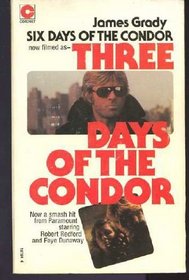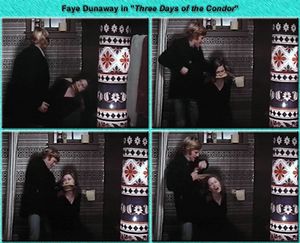Three Days of the Condor
Three Days of the Condor is a 1975 American political thriller film directed by Sydney Pollack and starring Robert Redford, Faye Dunaway, Cliff Robertson, and Max von Sydow. The screenplay by Lorenzo Semple, Jr. and David Rayfiel was adapted from the 1974 novel Six Days of the Condor by James Grady. The main point of variance from novel to film lies in the presentation of the CIA. In Grady's book, a rogue element within the Agency is motivated by drug-running greed. In the film, the same individuals act with equal ruthlessness to hide a project intended to protect long-term national interests.
Set mainly in New York City and Washington, D.C., the film is about a bookish CIA researcher who comes back from lunch, discovers all his co-workers shot dead, and tries to outwit those responsible until he figures out whom he can really trust. The film was nominated for the Academy Award for Best Film Editing. Semple and Rayfiel received an "Edgar Award" from the Mystery Writers of America for Best Motion Picture Screenplay.
Plot
Joe Turner (Robert Redford) is a CIA analyst, code name "Condor". He works in a clandestine office in New York City, which fronts as the "American Literary Historical Society". Turner's task is to read books, newspapers, and magazines from around the world, looking for hidden meanings and new ideas. As part of his duties, Turner files a report to CIA headquarters on a low-quality thriller novel his office has been reading, pointing out strange plot elements therein, and the unusual assortment of languages into which the book has been translated.
On the day that Turner is expecting a response to his report, he is shopping for staff lunches when armed men efficiently murder the six people still in the office. Returning to find his coworkers' bodies, a frightened Turner calls the CIA's New York headquarters and is given instructions to meet his Head of Department (Wicks), who will bring him into safety. The rendezvous is however a trap. Wicks shoots an accompanying CIA staffer and attempts to kill Turner, who wounds his assailant before escaping himself.
Needing a place to hide, Turner forces a woman, Kathy Hale (Faye Dunaway), whom he encounters by chance in a ski shop, to take him to her apartment in Brooklyn Heights. He holds her prisoner while he attempts to figure out what is going on. Hale begins to trust Turner and they become lovers. However, his hiding place is discovered by Joubert: a European contract killer who led the massacre of Turner's co-workers. Joubert spots Turner driving Hale's car and notes the license plate number. A hitman disguised as a postman, with a parcel that requires a signature, arrives at the apartment and a fight ensues. Turner, although a bookish researcher, is able to kill his attacker through chance.
Deciding that he cannot trust anyone within the CIA, Turner begins to play a cat-and-mouse game with Higgins (Cliff Robertson), deputy director of the CIA's New York division. With the help of Hale, Turner abducts Higgins, who identifies Joubert as a skilled freelance assassin, who has previously undertaken contract work for the CIA. Back at his office, Higgins discovers that the "postman" who attacked Turner in Hale's apartment worked with Joubert on a previous operation. Their CIA case officer on that occasion was Wicks.
Meanwhile, using a numbered hotel room key he found on the fake postman's body, Turner learns where Joubert is staying, then uses his skills as a former Army Signals Corps technician to trace a call that the expert makes from his hotel room. He then finds the name and address of the person Joubert called: Leonard Atwood (Addison Powell); CIA Deputy Director of Operations for the Middle East and apparently senior to Higgins. Turner confronts Atwood in his Chevy Chase mansion late at night and questions him at gunpoint. Turner learns that the report he had filed provided links to a secret plan to take over Middle Eastern oil fields. The planning "game" is later described as a rogue project initiated without formal approval from above. Fear of its disclosure was sufficient to have Atwood order the elimination of Turner's section.
Joubert surprises them, takes away Turner's pistol, and then unexpectedly shoots Atwood. Atwood's own superiors have hired the professional to stage the suicide of someone who was about to become an embarrassment, overriding Atwood's original contract for Joubert to kill Turner. Joubert suggests that Turner leave the country, even becoming an assassin himself since Turner had shown such resourcefulness in staying alive. Turner rejects the suggestion but seems to take seriously Joubert's warning that the CIA will still try to kill him. Joubert reflects how Turner's killing would likely be carried out - by a smiling and possibly trusted acquaintance stepping from a car.
Turner goes back to New York City and meets Higgins on a busy street. Higgins defends the oil fields plan, claiming that there will be a day in which oil shortages will cause a major economic crisis for the country and that Americans will want the government to use any means necessary to save them from discomfort. Turner says he has given the press "a story" (they are standing outside The New York Times office), but Higgins questions Turner's assurance that the story will be printed. After a brief dialogue, an anxious Turner walks away to face an uncertain future as "a very lonely man". The final shot is a freeze-frame of Turner passing behind a Salvation Army band singing Christmas carols while looking over his shoulder toward the camera.
External links
- Review Review Three Days of the Condor on Internet Movie Database
- Three Days of the Condor at All Movie Guide
- Review Three Days of the Condor at the Turner Classic Movie Database
Chat rooms • What links here • Copyright info • Contact information • Category:Root

